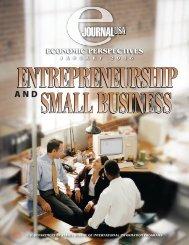s. history us history us history - Embassy of the United States
s. history us history us history - Embassy of the United States
s. history us history us history - Embassy of the United States
- No tags were found...
You also want an ePaper? Increase the reach of your titles
YUMPU automatically turns print PDFs into web optimized ePapers that Google loves.
CHAPTER 13: DECADES OF CHANGE: 1960-1980OUTLINE OF U.S. HISTORY“I have a dream that one dayon <strong>the</strong> red hills <strong>of</strong> Georgia,sons <strong>of</strong> former slaves and<strong>the</strong> sons <strong>of</strong> former slaveowners will be able to sitdown toge<strong>the</strong>r at <strong>the</strong> table<strong>of</strong> bro<strong>the</strong>rhood.”By 1960, <strong>the</strong> <strong>United</strong> <strong>States</strong> was on<strong>the</strong> verge <strong>of</strong> a major social change.American society had always beenmore open and fluid than that <strong>of</strong><strong>the</strong> nations in most <strong>of</strong> <strong>the</strong> rest <strong>of</strong> <strong>the</strong>world. Still, it had been dominatedprimarily by old-stock, white males.During <strong>the</strong> 1960s, groups that previo<strong>us</strong>lyhad been submerged or subordinatebegan more forcefully andsuccessfully to assert <strong>the</strong>mselves: AfricanAmericans, Native Americans,women, <strong>the</strong> white ethnic <strong>of</strong>fspring <strong>of</strong><strong>the</strong> “new immigration,” and Latinos.Much <strong>of</strong> <strong>the</strong> support <strong>the</strong>y receivedcame from a young population largerthan ever, making its way througha college and university system thatwas expanding at an unprecedentedpace. Frequently embracing “countercultural”life styles and radicalMartin Lu<strong>the</strong>r King Jr., 1963politics, many <strong>of</strong> <strong>the</strong> <strong>of</strong>fspring <strong>of</strong> <strong>the</strong>World War II generation emerged asadvocates <strong>of</strong> a new America characterizedby a cultural and ethnicpluralism that <strong>the</strong>ir parents <strong>of</strong>tenviewed with unease.THE CIVIL RIGHTSMOVEMENT 1960-1980The struggle <strong>of</strong> African Americansfor equality reached its peak in <strong>the</strong>mid-1960s. After progressive victoriesin <strong>the</strong> 1950s, African Americansbecame even more committedto nonviolent direct action. Groupslike <strong>the</strong> Sou<strong>the</strong>rn Christian LeadershipConference (SCLC), made up<strong>of</strong> African-American clergy, and<strong>the</strong> Student Nonviolent CoordinatingCommittee (SNCC), composed<strong>of</strong> younger activists, sought reformthrough peaceful confrontation.In 1960 African-American collegestudents sat down at a segregatedWoolworth’s lunch counterin North Carolina and ref<strong>us</strong>ed toleave. Their sit-in captured mediaattention and led to similar demonstrationsthroughout <strong>the</strong> South. Thenext year, civil rights workers organized“freedom rides,” in which AfricanAmericans and whites boardedb<strong>us</strong>es heading south toward segregatedterminals, where confrontationsmight capture media attentionand lead to change.They also organized rallies, <strong>the</strong>largest <strong>of</strong> which was <strong>the</strong> “Marchon Washington” in 1963. Morethan 200,000 people ga<strong>the</strong>red in<strong>the</strong> nation’s capital to demonstrate<strong>the</strong>ir commitment to equality forall. The high point <strong>of</strong> a day <strong>of</strong> songsand speeches came with <strong>the</strong> address<strong>of</strong> Martin Lu<strong>the</strong>r King Jr., who hademerged as <strong>the</strong> preeminent spokesmanfor civil rights. “I have a dreamthat one day on <strong>the</strong> red hills <strong>of</strong> Georgia<strong>the</strong> sons <strong>of</strong> former slaves and <strong>the</strong>sons <strong>of</strong> former slave owners will beable to sit down toge<strong>the</strong>r at <strong>the</strong> table<strong>of</strong> bro<strong>the</strong>rhood,” King proclaimed.Each time he <strong>us</strong>ed <strong>the</strong> refrain “I havea dream,” <strong>the</strong> crowd roared.The level <strong>of</strong> progress initiallyachieved did not match <strong>the</strong> rhetoric<strong>of</strong> <strong>the</strong> civil rights movement. PresidentKennedy was initially reluctantto press white Sou<strong>the</strong>rners forsupport on civil rights beca<strong>us</strong>e heneeded <strong>the</strong>ir votes on o<strong>the</strong>r issues.Events, driven by African Americans<strong>the</strong>mselves, forced his hand. WhenJames Meredith was denied admissionto <strong>the</strong> University <strong>of</strong> Mississippiin 1962 beca<strong>us</strong>e <strong>of</strong> his race, Kennedysent federal troops to uphold <strong>the</strong> law.After protests aimed at <strong>the</strong> desegregation<strong>of</strong> Birmingham, Alabama,prompted a violent response by <strong>the</strong>police, he sent Congress a new civilrights bill mandating <strong>the</strong> integration<strong>of</strong> public places. Not even <strong>the</strong> Marchon Washington, however, could extricate<strong>the</strong> measure from a congressionalcommittee, where it was stillbottled up when Kennedy was assassinatedin 1963.President Lyndon B. Johnsonwas more successful. Displayingnegotiating skills he had so frequentlyemployed during his yearsas Senate majority leader, Johnsonpersuaded <strong>the</strong> Senate to limit delayingtactics preventing a final voteon <strong>the</strong> sweeping Civil Rights Act <strong>of</strong>1964, which outlawed discriminationin all public accommodations.The next year’s Voting Rights Act<strong>of</strong> 1965 authorized <strong>the</strong> federal governmentto register voters where local<strong>of</strong>ficials had prevented AfricanAmericans from doing so. By 1968a million African Americans wereregistered in <strong>the</strong> deep South. Nationwide,<strong>the</strong> number <strong>of</strong> African-American elected <strong>of</strong>ficials increasedsubstantially. In 1968, <strong>the</strong> Congresspassed legislation banning discriminationin ho<strong>us</strong>ing.Once unleashed, however, <strong>the</strong>civil rights revolution producedleaders impatient with both <strong>the</strong> pace<strong>of</strong> change and <strong>the</strong> goal <strong>of</strong> channel-276277












